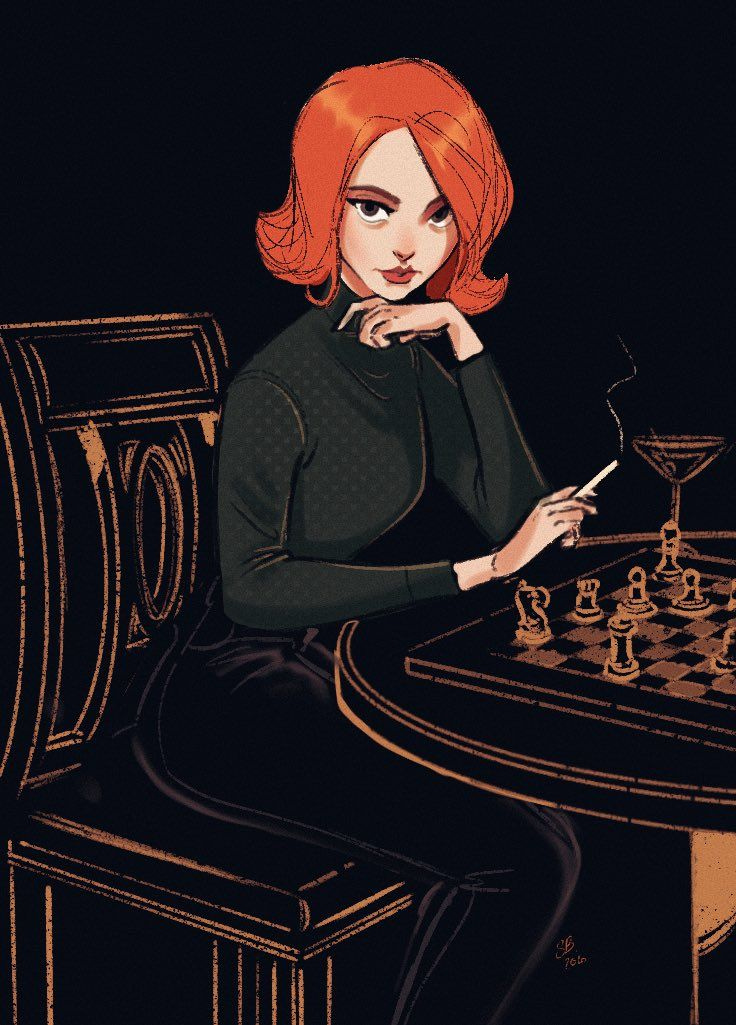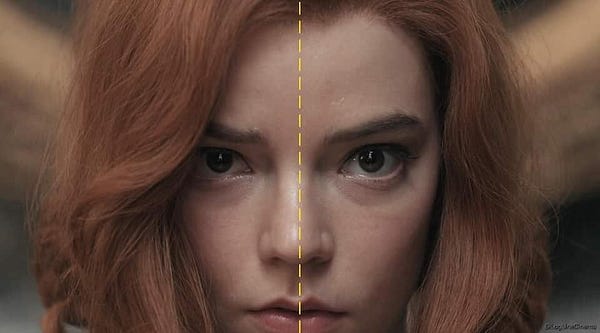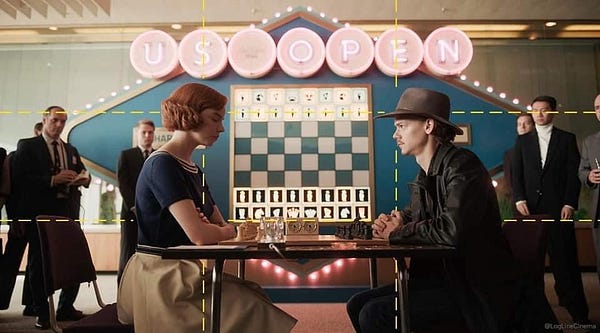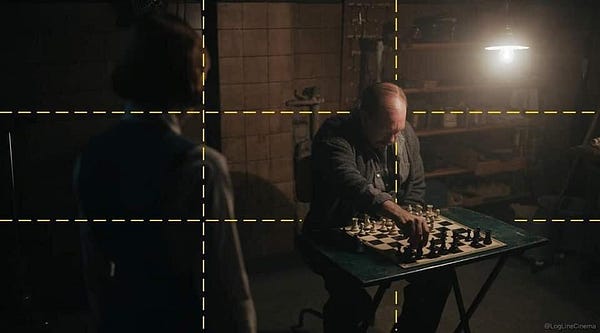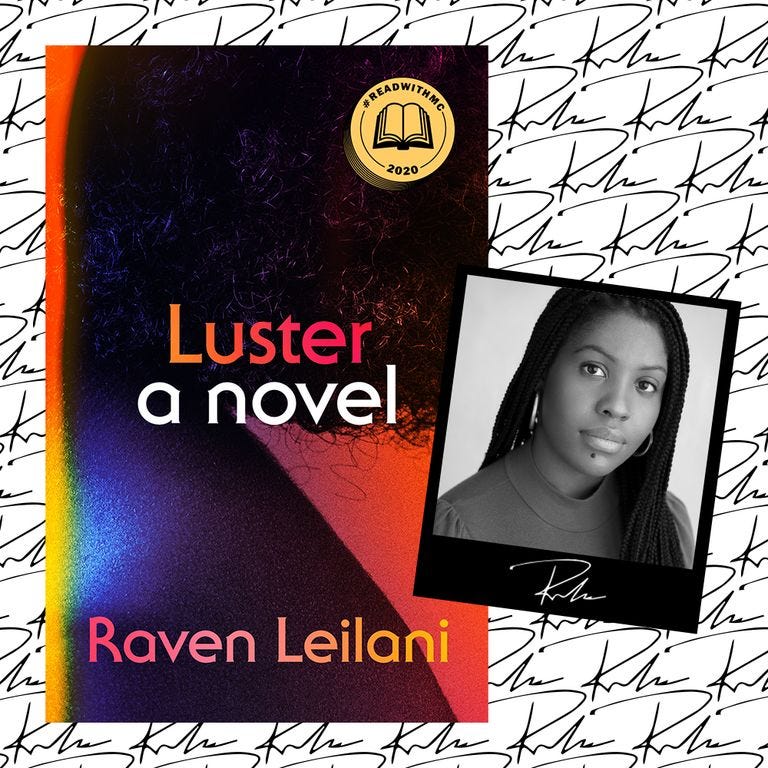Why we all loved 'The Queen’s Gambit' ♟️💊🍸
Silence as a part of the story, writing about race, and a short story about goodbyes.
Hello, friends! Let’s begin by addressing the elephant in the newsletter. A certain New York Times journalist who shall remain unnamed* coaxed me into switching the name of this publication because I’m “not a himbo.” So, RIP Himbo Reads … That tragedy aside, this month’s newsletter is focused on female-centric stories. In this issue we talk about:
Netflix’s “The Queen’s Gambit”
Raven Leilani’s novel “Luster”
Flash fiction by Lorraine Roque
Feel free to bookmark this page or save the email, and come back to it as you have time. And remember to submit (or tell a friend to submit) a short story to joshuanriverajimenez@gmail.com!
Next issue: I hope to go over: HBO’s “La Veneno,” Alix E. Harrow’s “The Once and Future Witches,” and a fantasy tale by a short story writer from the Phillipines. You can check out my previous issue here.
Resource: Looking to write compelling characters? The devil is in the details, as they say. Here’s a character questionnaire from Reedsy to get you started.
*Email me if you want to know.
Why we all fell in love with the Queen’s Gambit
According to Netflix, “The Queen’s Gambit” (QB) was watched by 62 million households in its first four weeks, making it Netflix's biggest scripted limited series to date. The series also topped the trending list in 63 countries. But why are we all so entranced by the story of an introverted chess prodigy?
Because of silence.
My theory is that QB follows the same approach of a sketch drawing before it’s colored and finalized. (Stick with me on this.) When you draw a sketch there are several lines drawn for the same purpose. Your brain picks the one most pleasing to you and fills in the blanks. Similarly, with the introduction of sound to films in the ‘20s, silence gained meaning. And with QG, there’s a lot of space left for our minds to fill in.
During the third of seven episodes, the main character Beth Harmon is described as “quiet, well-mannered and out for blood.” And doesn’t that encompass most of us? (Or at least how most of us are taught to be.) In Beth, we see our strengths and our flaws, because we are allowed the time and space to adapt the story for ourselves.
I know it’s cliché to think of yourself as the main character of the show, but with silence playing an important part of the story it forces your brain to be introspective about what is your “chess,” who is “Borgov” in your life, and what is your “alcoholism/drug abuse.”
QB succeeds in its narrative by what it doesn’t say as much as it does by what it does. Yes, it’s a sort of “rags-to-riches” story that we all love, and it’s always enjoyable to see someone at the top of their game, but we don’t get much of that in the first two episodes. So why were we so hooked? It’s because we wanted to figure out this — mostly — silent girl, and in doing so we put some of the work behind the story. Whether you thought of yourself or someone else, you were an active participant in the story and became invested in this girl battling against the odds to win.
Why do you think Queen’s Gambit held your attention?
Should I skip it? Of course not. If I were to say it’s a story about a girl who’s really good at chess I’m not sure I would get 62 million households to watch, but if I told you it’s a story about a girl using her innate talent to defeat an older Russian man … I’m still not sure you’d watch, so just trust word-of-mouth on this one.
‘Luster’ answers the question: What if someone wrote a book about that time in your 20s when you made the worst decisions of your life?
Let me begin by saying that Raven Leilani crafts beautiful prose. “Luster” is funny, insightful, and addictive. That’s what first got me hooked. It’s a big chisme about a young woman’s life, and who doesn’t love that?
There’s a line near the end where the main character Edie says, “I think of all the gods I’ve made of feeble men.” It stuck with me because it encapsulates how earnest, descriptive, and succinct Leilani is. The entire book is riddled with one-liners that make you stop and marvel.
That being said, I couldn’t connect with any of the characters. Not because I wasn’t a mess during my 20s, I definitely was, but there’s no rooting for anyone. It’s more of a personal taste, of course, but I need the character to have an objective. In this case, Leilani depicts a realistic snapshot of her character’s life. And just like real life, sometimes we’re aimless.
I will say, this is a great example of writing about race without it being the only defining characteristic. Leilani does an amazing job of introducing the aspect of her character’s race when it plays a part in the story, but it’s not one-dimensional. All the scenes between Edie and Akila (a young Black girl) are nuanced and real. The story is about race, and it is about the complexities of navigating that in a relationship with a white family, but the character doesn’t need to remind you she’s Black all the time. She (and by extension you as the reader) is acutely aware of her existence without having to remind herself.
Speaking as a POC, I don’t think of my ethnicity on a constant basis — only when I want to call someone a comemierda and they don’t understand. So take that and run with it when writing about characters of different races. Do your research and don’t have them be “just” the Black/Asian/Hispanic character.
In the story, Edie hooks up with several coworkers. Have you done that, feel like sharing that chisme? Cause I’m all ears/eyes 👀
Should I skip it? Tbh, you can. I enjoyed “The Vanishing Half” by Brit Bennett a bit more in terms of a story exploring life choices intersecting with race. That being said, Luster is much more current and the prose is a delight.
📚 Storytime: Answering the door
The author is Lorraine Roque, MBA; M. Ed. You can reach her at lorraineroque328@gmail.com
(Spanish and English versions included.)
Número 127
Bajó del taxi y caminó por las calles bañadas por la lluvia. La suave neblina cubría el camino y la tenue luz titilaba ausente. Miró su reloj y apresuró el paso. No quería llegar tarde. Al pasar por un aparador, observó detenidamente su imagen; no había cambiado. Eso era algo bueno, pensó.
Recordó con nostalgia las veces que cruzó aquel mismo camino. Todo había cambiado. Todo estaba igual. Tal vez, quien había cambiado era él. Eso lo sabía. Volvió a mirar el reloj y conjuró en un suspiró el ansiado saludo que saldría de sí.
Recorrió la plaza y allí estaba. Al fin llegó. Ni en mil años podría olvidar aquella puerta. La puerta roja número 127.
Suspiró.
Toco el timbre y esperó.
Number 127
He got out of the taxi and walked through the rain-soaked streets. Soft mist covered the path and the dim light flickered absent. He glanced at his watch and quickened his pace. He didn't want to be late. As he passed a sideboard, he carefully studied his image; it had not changed. That was a good thing, he thought.
He remembered with nostalgia the times he had crossed that same path. Everything had changed. Everything was the same. Perhaps it was him who had changed. That he knew. He looked at his watch again and conjured in a sigh the long-awaited greeting that would come out of him.
He walked around the square and there he was. At last, he arrived. Not in a thousand years could he forget that door. Red door number 127.
He sighed.
He rang the bell and waited.
Puerta roja
La mañana había amanecido triste y fría. Una de esas mañanas que auguran un día gris; casi negro. Bajó las escaleras apresuradamente y miró por la ventana la calle solitaria. De repente sintió deseos de salir y mojarse con la lluvia. Pero esos impulsos ya no formaban parte de su vida. Si es que había vida.
La vida se la había llevado él, y olvidó regresarla.
Sus días se habían convertido en un mal libreto que alguien olvidó terminar. Solo existían días repetitivos, monótonos y sin final. Como un gran laberinto de espinas sin rosas.
Cerró la cortina y se sentó en un rincón. ¿De qué servía ver la vida pasar si ya no quedaba nada…? Era mejor aceptar y no reprochar, pensó. Conformarse que pelear, que renegar, que culpar. Tal vez fuera cobardía, pero el valor se había escapado de su cuerpo.
El timbre de la puerta rompió el silencio con un disparo. Como una mentira rompía un corazón.
Abrió la puerta y sonrió.
Red Door
The morning had dawned sad and cold. One of those mornings that augur a gray day; almost black. She hurried down the stairs and looked out the window at the lonely street. Suddenly she wanted to go out and get wet in the rain. But those urges were no longer a part of her life. If there was life.
Life had been taken by him, and he had forgotten to return it.
Her days had become a bad script that someone forgot to finish. There were only repetitive, monotonous, and endless. Like a great labyrinth of thorns without the roses.
She closed the curtain and sat in a corner. What was the use of watching life go by if there was nothing left ...? Better to accept and not place blame, she thought. Conform in lieu of fighting, denying, blaming. It might be cowardice, but the courage had escaped her body.
The doorbell broke the silence with a shot. Like a lie breaking a heart.
She opened the door and smiled.
¿Adiós?
- ¿Te vas a quedar?
Era la pregunta silenciosa que se repetía en el aire.
-No lo sé.
La incertidumbre se había instalado en aquellos huesos y no pensaba abandonarlos. Las dudas que poblaban su razón ahora bailaban al ritmo compuesto por su llanto.
Ella miró por la ventana y observó llegar la muerte por segunda vez. La luz que brillaba en sus ojos se apagó y su alma quedó oscura; como una noche sin luna. Su corazón poco a poco se desgarraba en su interior y ríos de sangre bañaban su sonrisa.
- ¿Por qué regresaste?, preguntó ella.
Él no contestó.
Goodbye
“Are you going to stay?”
It was the silent question that was repeated in the air.
“I do not know.”
Uncertainty settled in those bones and she was not going to abandon them. The doubts that populated her reason now danced to the rhythm composed by her crying.
She looked out the window and watched death come a second time. The light that shone in her eyes faded and her soul went dark; like a moonless night. Her heart was slowly tearing inside her and rivers of blood bathed her smile.
“Why did you come back?” She asked.
He did not answer.
Before you go …
This is *gestures widely* our newsletter. If you wrote a short story and would like for it to be featured, please email me at joshuanriverajimenez@gmail.com to be considered.
I only ask that it’s compelling fiction. Big plus if it includes POC and/or LGBTQ characters or issues. I request no exclusivity and it doesn’t have to be recent.


